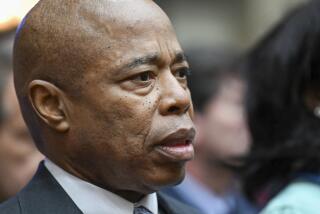Eyewitness Saw No Rape, Kennedy Case Defense Says
- Share via
PALM BEACH, Fla. — Lawyers for William Kennedy Smith disclosed Monday that an eyewitness disputes a 29-year-old woman’s allegation that Smith raped her at the Kennedy family estate here, and can testify that “nothing untoward” occurred.
Existence of the eyewitness, whose name was not revealed, came as the defense lawyers sought to pressure Palm Beach police from making public more than 1,300 pages of investigative files that the attorneys claim are incomplete.
The files give “an unfair, one-sided” summary of the probe, Mark P. Schnapp, Smith’s Palm Beach lawyer, said in a letter Monday to David H. Bludworth, Palm Beach County state attorney.
“We are aware that much of the exculpatory testimony that was obtained (including testimony from an eyewitness) either has not been transcribed or corrected and, therefore, is not available for disclosure,” Schnapp wrote. By providing a partial file to the public, the state again is providing a one-sided picture of the events at issue.”
Bludworth filed charges Thursday against Smith, accusing him of second-degree sexual battery and battery.
The alleged incident took place March 30 around 4 a.m., after Smith, 30, was drinking at a chic bar here with the woman, his uncle, Sen. Edward M. Kennedy (D-Mass.), and Kennedy’s son Patrick, 24, a Rhode Island legislator. The woman drove Smith back to the family estate, where he allegedly attacked her near the swimming pool as she was trying to leave. The woman told police that Smith tackled her, slammed her to the ground and then raped her as she screamed and tried to fight him off.
Smith, who has branded her account an “outrageous lie” and insisted he committed no offense of any kind, surrendered to police here Saturday. That triggered public release of the investigative files under the state’s public records law, Palm Beach officials maintain.
But John C. Randolph, counsel for the town of Palm Beach, gave Smith’s lawyers until noon today to seek a court order barring release of the files. Otherwise, “the information will be disseminated as public records,” he wrote Schnapp on Monday.
Randall Turk, a Washington lawyer for Smith, said defense attorneys would not go to court to block the release. Instead, the Smith defense team wrote to Bludworth implying that a release of files which did not include exculpatory material could cause the prosecution problems later.
“We strongly object to the dissemination of this file at this juncture because it is misleading and will seriously impair Mr. Smith’s ability to receive a fair trial,” Schnapp said. Turk added that he favored “releasing everything.”
“If the state seeks to release part of its investigative file at this time, it proceeds at its peril,” Schnapp wrote to Randolph Monday night. “We have stated our objection to the release of the file, particularly without the full disclosure of exculpatory information including that of a witness to the alleged incident who saw absolutely nothing consistent with the accuser’s story.”
In an earlier letter Friday to Bludworth, Schnapp contended that the state attorney had filed an “argumentative and prejudicial probable cause affidavit” along with the criminal charges.
“Notably absent from the affidavit was any mention of the sworn testimony of the eyewitness to the alleged rape who saw nothing untoward or the sworn testimony of the numerous people in the house who did not hear any of the screaming or yelling that the (woman) claims to have occurred,” Schnapp wrote.
The Times has previously reported that the 11 occupants of the mansion the Easter weekend of the alleged attack have told police they heard no disturbance, even though most of them were sleeping with their windows open on a humid night.
But the discovery by investigators retained for Smith of an eyewitness who challenges the woman’s account has not been known publicly. The woman told of seeing Kennedy and his son Patrick twice in the mansion and on the grounds before the attack took place. But it was learned that neither of them is the eyewitness.
Randolph, the town counsel, said in his letter to Schnapp that Palm Beach “does not wish to prejudice either the state or the defendant by way of its release of documents in its possession.” But citing advice by Bludworth’s office and Florida law, Randolph said, “we believe that this investigative information is now subject to public disclosure.”
Randolph made no reference in his letter to the defense attorneys’ arguments that the file is incomplete and biased.
More to Read
Sign up for Essential California
The most important California stories and recommendations in your inbox every morning.
You may occasionally receive promotional content from the Los Angeles Times.













